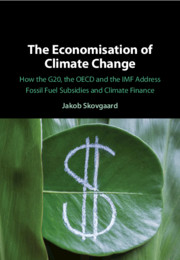Crossref Citations
This Book has been
cited by the following publications. This list is generated based on data provided by Crossref.
Elliott, Christian
Bernstein, Steven
and
Hoffmann, Matthew
2022.
Credibility dilemmas under the Paris agreement: explaining fossil fuel subsidy reform references in INDCs.
International Environmental Agreements: Politics, Law and Economics,
Vol. 22,
Issue. 4,
p.
735.
Skovgaard, Jakob
Adams, Kevin M.
Dupuy, Kendra
Dzebo, Adis
Funder, Mikkel
Fejerskov, Adam Moe
and
Shawoo, Zoha
2023.
Multilateral Climate Finance Coordination: Politics and Depoliticization in Practice.
Global Environmental Politics,
Vol. 23,
Issue. 2,
p.
125.
Campbell-Verduyn, Malcolm
2023.
Conjuring a cooler world? Imaginaries of Improvement in Blockchain Climate Finance Experiments.
Environment and Planning C: Politics and Space,
p.
239965442311628.
Eisenstadt, Todd A.
and
Lopez, Jennifer
2023.
Specifying the Gap between Nations’ Outward-Looking and Domestic Climate Policies: A Call for Measures of Domestic Climate Policy Stringency.
Climate,
Vol. 11,
Issue. 9,
p.
192.
van Asselt, Harro
2023.
The SDGs and fossil fuel subsidy reform.
International Environmental Agreements: Politics, Law and Economics,
Vol. 23,
Issue. 2,
p.
191.
Deyris, Jérôme
2023.
Too green to be true? Forging a climate consensus at the European Central Bank.
New Political Economy,
Vol. 28,
Issue. 5,
p.
713.
Soener, Matthew
2024.
Are IMF programs raising greenhouse gas emissions in the Global South?.
Socio-Economic Review,





